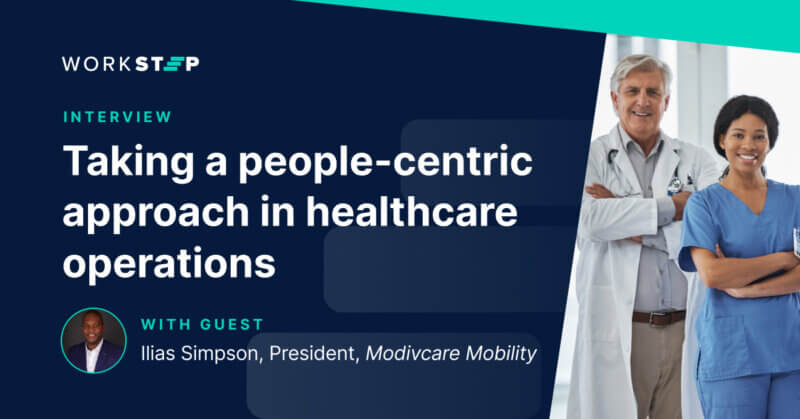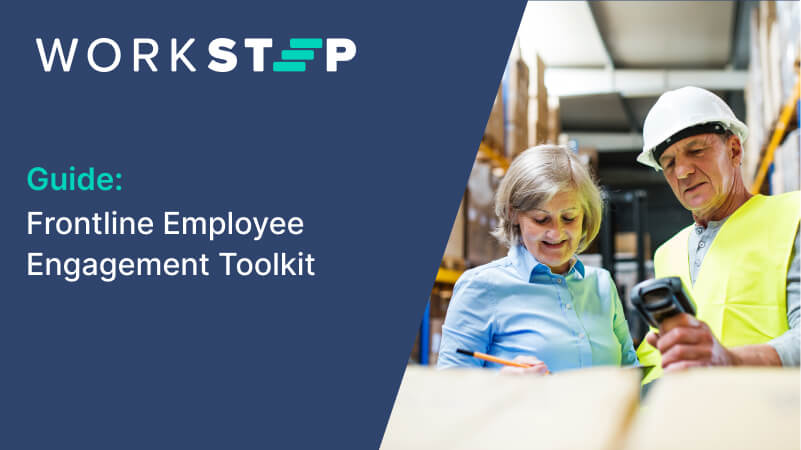Workforce Management Strategies
Cultivating a people-centric approach to healthcare operations management
February 2, 2024
In most industries failure does not mean life or death, but in high-stakes environments like healthcare operations management and logistics, the margin for error is minimal and the impact is felt far beyond the customer’s doorstep. In an insightful conversation between Ilias Simpson, President of Modivcare Mobility, and Dan Johnston, CEO at WorkStep, we shed light on the importance of customer needs, workforce retention, the pivotal role new technology plays, and valuable lessons for any organization striving for excellence in today’s competitive landscape. With a proven track record in transforming companies into profitable growth engines, Simpson is dedicated to delivering high-quality patient outcomes and exceptional workforce experiences through a culture of operational excellence and continuous improvement.
The interplay of healthcare and logistics
Healthcare logistics goes well beyond the traditional boundaries of transportation and delivery. It’s a specialized field where the cargo is the people themselves — members with diverse and critical healthcare needs, with stories to tell, families to love, art to make, and so much more that defines them beyond being a patient. The responsibility of member care is immense, as logistics directly impact outcomes, treatment efficacy, and overall health system efficiency. In this sector, challenges range from ensuring timely transportation to maintaining the highest standards of care.
Healthcare logistics plays an especially pivotal role in addressing social determinants of health by ensuring accessibility to necessary care, especially in underserved or remote areas.
For healthcare logistics leaders, specifically in transportation, operational excellence is a concept that extends beyond efficiency and timeliness. It starts with the fundamental principle of member satisfaction, ensuring that every interaction contributes positively to the member’s healthcare journey. This not only involves timely pickups and deliveries but also encompasses the entire experience – from the empathy and professionalism of drivers to the accuracy and privacy of the member’s information.
“When you’re doing operational excellence correctly, you start with the customer in mind,” Simpson says, highlighting a non-negotiable – for companies to adopt a customer-centric approach in all their strategies. Modivcare Mobility invests in rigorous training for its staff to handle medical emergencies, understand needs, and communicate effectively and compassionately. They also implement advanced route planning and tracking technologies to ensure reliability and punctuality.
Operational excellence also means creating a seamless, stress-free experience for both the members and the healthcare providers. It involves meticulous planning and execution to ensure that transportation does not become an additional source of stress for the members. This requires a deep understanding of the healthcare system’s workings, member needs, and logistical challenges at all levels of the organization – highlighting the importance of retaining well-trained employees who are committed to the mission.
Building a culture of operational excellence in healthcare
Simpson leads with the idea that operational excellence is a twofold problem, “you start with the customer in mind and work backward, but then also your job is to make it easy for the employees within your organization to be successful.”
The leadership at Modivcare Mobility clearly articulates the company’s vision for operational excellence starting at a new hire’s orientation through the ongoing training of tenured employees. By communicating the concept of “a perfect trip” regularly and integrating it into the company’s narrative, the workforce:
- Understand the direction and purpose of their work
- Commit to the organization’s mission statement
- See themselves as a necessary part of a greater story
The environment and culture of any organization play a crucial role in promoting excellence. Modivcare Mobility creates this ecosystem by providing the necessary resources, training, and support each individual needs to excel in their jobs and fully understand the market in which they compete. Their efforts also involve creating a psychologically safe atmosphere where personnel can voice concerns, make suggestions, and take calculated risks without fear of retribution.
Some key elements of a culture that promotes excellence in healthcare operations management:
- Clear communication: Communication is more than just the exchange of information, it’s about ensuring that every team member understands the company’s vision, their role in it, and how their work impacts the broader objectives.
- Continuous improvement: Operational excellence is not a one-time achievement but a continuous journey that involves constantly looking for ways to improve processes, enhance efficiency, and innovate solutions. By learning from both successes and failures, Modivcare Mobility encourages a mindset of continuous improvement.
- Relentless focus on quality: Quality is the cornerstone of operational excellence as every process, interaction, and decision is geared towards maintaining the highest standards. Regular quality audits and member satisfaction surveys are part of any winning culture, driving everyone to contribute at the highest standard.
- Encouraging innovation: By providing a safe space for the team to experiment, suggest new ideas, and challenge the status quo, organizations are better suited to identify and invest in new technologies, support creative problem-solving, or reward innovative contributions.
- Recognizing excellence: Acknowledging and celebrating achievements, big or small, reinforces the behaviors and attitudes that contribute to operational excellence. Modivcare Mobility recognizes the hard work and achievements of its team through awards, acknowledgments, and career advancement opportunities.
- Transparent and inclusive environment: Modivcare Mobility ensures that its operations, decisions, and challenges are transparent to all team members. Valuing and incorporating diverse perspectives leads to better decision-making and a more resilient culture where individuals are empowered to voice their ideas and concerns, creating a sense of ownership and commitment to collective goals.
Operational excellence can only be achieved when individual goals and efforts align with the company’s vision, which acts as the north star for all strategies, decisions, and actions.
Modivcare Mobility celebrates successes as milestones towards excellence, while failures are analyzed for lessons with both outcomes proving necessary and valuable in their own right. This approach ensures that the journey towards operational excellence is a shared, inclusive, and dynamic one with every team member playing an active role in driving the company forward.
Employee retention as a pillar of success
“You can’t recruit your way out of a retention problem” – Dan Johnston
Effective healthcare operations management also hinges on robust retention strategies. Workforce turnover in any industry, especially in one as critical as healthcare logistics, can have far-reaching consequences. When an experienced team member leaves, they take with them valuable knowledge and skills acquired over years of service. The organization loses much more than a competent worker; they lose someone who has built a relationship with their patients, knows how to quell their anxieties, is familiar with their family dynamics, and other intangibles that can not be taught during onboarding.
The void left behind requires more than the cost of replacing the role, it requires a period of learning and adaptation for the newcomer, during which the quality of service can dip. High turnover rates can lead to a cyclical pattern of hiring, training, and loss, each cycle consuming significant time, financial resources, and a growing lack of trust for the patients. Retention, therefore, is not merely an HR metric; it’s a critical business strategy.
“[Reducing] turnover is the number one priority amongst our frontline workforce. You have to retain your workforce if you want to grow your business,” Simpson says, doubling down on Johnston’s claim that the best way to grow the workforce is to retain your top talent. Retaining employees is about preserving the collective knowledge and experience that contributes to the smooth and effective operation of the organization. Long-term employees develop a deep understanding of the company’s culture, processes, and clients, enabling them to contribute more effectively and mentor new employees more easily.
Simpson recalls an internal conversation with his people team that brought up the idea that organizations don’t have B or C-grade talent, they have B or C-grade roles. That’s why investing in growth and development is a cornerstone of Modivcare Mobility’s retention strategy. Comprehensive training programs equip individuals with the skills needed to perform their roles effectively while also demonstrating the company’s commitment to personal and professional development. For Simpson, it is the organization’s responsibility to provide individuals with the tools they need to thrive as opposed to employees over-performing while being under-resourced, as is the case with many organizations.
Recognizing the hard work and dedication of employees through competitive compensation and a comprehensive benefits package is vital as well. Modivcare Mobility ensures that its remuneration is not just market-competitive but reflects the value and impact of the individual’s work. Benefits are tailored to meet the diverse needs of the workforce, including health benefits, retirement plans, and wellness programs, contributing to overall job satisfaction and loyalty. Transparency is key and providing the workforce with the “Why” behind their compensation compared to the rest of the market helps solidify their place within the organization and their commitment to the mission.
Modivcare Mobility engages its workforce through regular feedback, including surveys, focus groups, and ride-alongs. Simpson highlights how focus groups go a long way toward shaping the organization’s vision and execution, “We talk about the ‘perfect trip’ and everybody knows what their role is in delivering that. Whether it be from me as president or the person who’s taking the reservation on the phone, we understand what our roles and responsibilities are in creating it.”
Recognition programs and career development opportunities ensure employees feel rewarded for their contributions, not just in terms of business outcomes, but also their role in fostering a positive work culture. This sentiment goes well beyond the workplace, with ample policies and programs that support employees’ personal needs and family commitments. Flexible working arrangements, mental health resources, and family-friendly policies are examples of how the company supports its employees beyond the workplace, contributing to overall satisfaction and retention.
Tune into your frontline with WorkStep
With the frontline employee engagement platform that delivers the real-time insights you need to take action, retain your workforce, and drive your business forward.
Technology as an enabler of excellence
“Technology is extremely critical – if you’re not properly leveraging technology these days, you’re behind the game. If you’re not leveraging data, you’re behind the game.”
– Illias Simpson
Innovative technology is a cornerstone of effective healthcare operations management at Modivcare Mobility. One of the critical challenges in transportation logistics is ensuring that the destination addresses are accurate as incorrect addresses can lead to delays, missed appointments, and increased stress for patients and healthcare providers. Address verification software ensures the accuracy and validity of addresses from the point of entry. Modivcare Mobility utilizes technology to streamline every facet of its operations from advanced routing algorithms that optimize paths and reduce travel time, to automated scheduling systems that ensure appointments are kept and no patient is left waiting.
Effective communication is the backbone of any logistics operation, more so in healthcare, where timing and accuracy are critical. Instant and clear communication between all parties is a must for dispatchers and drivers as well as healthcare providers and patients alike. Real-time tracking systems provide up-to-the-minute information on vehicle locations and status, an invaluable tool for coordinating and monitoring deliveries and enhancing the safety and security of the patients in transit.
New tech stacks have enabled seamless integration with healthcare providers’ systems, ensuring that patient information, schedules, and needs are aligned and updated across platforms in real-time. This integration allows for more personalized care as logistics services can be tailored to the specific needs and preferences of each patient. Tools like mobile apps and web platforms keep everyone informed, ensuring that the right information is delivered to the right person at the right time.
Operational excellence is not just about doing things right; it’s about constantly improving how things are done. “Technology is extremely critical. Right off the bat, it helps you collect data. I like to be data-driven and have as many data points as I can to help drive decision-making,” Simpson claims. Modivcare Mobility embraces a data-driven approach, utilizing technology to collect, analyze, and interpret vast amounts of data from every operation. This data enables the company to identify trends, forecast needs, optimize resources, and preemptively address potential issues.
Simpson elaborates, “So technology helps to collect data quickly, aggregate that data, and start to look at trends and what your top five opportunity areas are. So, for me, technology is extremely critical. I think technology, as I said earlier, can be a connector, right?”
Modivcare Mobility’s real-time feedback systems enable the company to collect immediate and actionable insights from patients and employees. This feedback is a critical resource for identifying areas of success and opportunities for improvement. Whether it’s adjusting processes, addressing service issues, or recognizing exemplary employees, the open feedback systems ensure that the company continues to evolve and improve its services while fostering a collaborative workplace where every voice matters.
Overcoming challenges in a remote workforce
Simpson attributes regular virtual meetings to successfully bridging the distance in a remote workforce; ensuring frequent and regular check-ins, team meetings, and one-on-one sessions to foster a sense of belonging and maintain open lines of communication. Virtual social events, team-building activities, and peer recognition programs create a strong team culture, even for a dispersed workforce. These initiatives help build relationships, boost morale, and ensure that employees feel part of a cohesive community. This approach encourages employees to tap the person next to them for guidance and foster friendships that extend beyond the workplace.
Simpson highlights that sharing knowledge and best practices is essential in a decentralized workforce, as it helps employees build strong, foundational relationships. That’s why the organization encourages the use of platforms where team members can share insights, learn from each other’s experiences, and collaborate on solutions. This not only drives innovation and problem-solving but also ensures that all team members have access to the collective wisdom of the organization.
Understanding the unique challenges of remote work, Modivcare Mobility provides well-being resources and support systems for its workforce. This includes access to mental health resources, ergonomic advice for setting up home offices, and flexible working hours to accommodate different time zones and personal circumstances.
Managing a remote workforce in the healthcare logistics sector presents unique challenges, but with the right strategies and technology, these can be effectively overcome. Modivcare’s approach to maintaining connectivity, engagement, and a sense of community, coupled with its investment in technology and tools for training, communication, and recognition, ensures that its remote workforce is as integral, effective, and satisfied as any in-office team.
The heart of healthcare transportation
Modivcare Mobility stands at the intersection of healthcare and logistics, providing transportation services that are crucial for patient care. The interplay of healthcare and logistics is a dynamic and complex field that demands a high level of commitment, innovation, and empathy. Operational excellence in this sector is not just about moving people from point A to B; it’s about ensuring that each journey contributes positively to the member’s health and well-being. It’s a noble endeavor that combines the precision of logistics with the compassion of healthcare, ultimately striving to deliver not just people, but care, hope, and improved health outcomes.
Tori Cook, Senior Director of Demand Generation & GTM Operations | tori@workstep.com
Tori Cook is the Senior Director of Demand Generation & GTM Operations at WorkStep. With a proven track record of generating impactful results, Tori is passionate about sharing her expertise in operations, marketing, and workplace culture with the WorkStep blog readers.



